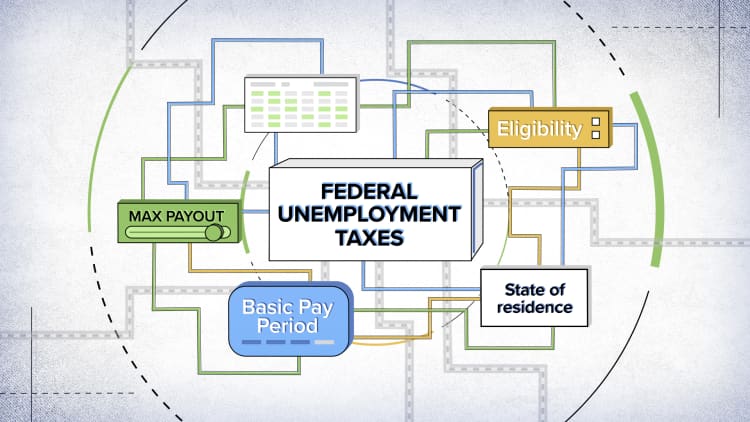
More than 22 million Americans are currently collecting unemployment benefits — and that compensation doesn't come for free. Many unemployed workers have no idea the benefit payments they receive in 2020 are taxed. So even those who sustain a significant drop in total income due to a job loss this year could still wind up with a tax bill next year.
"Most people don't realize it. They're thinking in the moment. They don't have much savings, credit is not great, and then come April 15, 2021, you have a big tax bill you're not expecting," said Ken Lin, CEO of Credit Karma, which offers a free online tax-preparation service.
State unemployment benefits, as well as the additional $600 per week in coronavirus relief that's provided by the federal government under the CARES Act through July 31, factor into your taxable income on your 2020 tax return.
Tax experts point out you don't have to pay Social Security and Medicare taxes on this money like you do on wages, but your unemployment benefits will be taxed by the federal government and possibly your state. And if you don't pay enough tax throughout the year, you could wind up also paying penalties and interest, too.
Lin remembers receiving unemployment benefits after losing his job at a tech company in the early 2000s — and he said he didn't know that compensation would be taxed. "Planning is what really matters. You can avoid all of that by putting dollars aside today," he said.
Here are three strategies to avoid facing an unexpected tax hit on your unemployment benefits.
1. Ask to have taxes withheld
When you apply for unemployment benefits through your state agency, ask to have 10% of your payments withheld to cover federal income taxes, said Oscar Vives Ortiz, a certified public accountant based in Tampa, Florida. "If you have the ability to do so, get the withholding in there as you're signing up."
If you're already receiving benefits, you can fill out an IRS Form W-4V, Voluntary Withholding Request, to adjust your withholding. You may also make changes to this on a biweekly basis when you're asked to recertify your unemployment claim, Lin said. Check with your state's unemployment insurance program to make sure you follow the appropriate steps. The U.S. Department of Labor's CareerOneStop website has links to every state's program.
More from Invest in You:
Struggling to pay your mortgage? Here's how to get help now
Here's a tax break you may not get during the pandemic
Answers to your biggest questions about US stimulus programs for Covid-19 relief
2. Pay estimated taxes
If you don't want to have income taxes withheld, you could pay estimated taxes every quarter. "If you're a small business owner or you're self-employed, then you're more likely to make estimated quarterly taxes," said Ortiz, who is also a member of the American Institute of CPAs Personal Financial Specialist Committee. However, he added, this option may not work for many unemployed people
3. Save part of your payment
Try to save 10% — or some portion — of each benefit payment. "Cash is king right now, and what's really important is maintaining flexibility," Lin said. "Put that money, that potential tax bill money, in a savings account, and then for a year you have some flexibility in case things get worse."
Unfortunately, the reality is that for millions of unemployed Americans, their financial lives are already worse than they expected.
Coming up with a strategy to avoid owing taxes next year may be the least of their concerns, Ortiz said. "If someone is struggling right now, they're saying, 'Forget the withholding. Let's put food on the table and keep the lights on. We'll worry about taxes when the economy recovers.'"
SIGN UP: Money 101 is an 8-week learning course to financial freedom, delivered weekly to your inbox.
CHECK OUT: What to do if you think your stimulus check is for the wrong amount via Grow with Acorns+CNBC.
Disclosure: NBCUniversal and Comcast Ventures are investors in Acorns.







